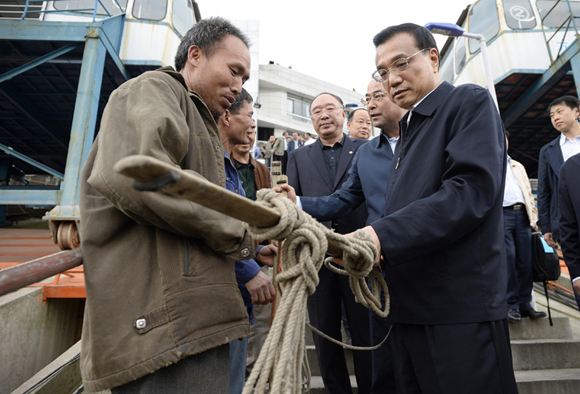Li Keqiang urges building Yangtze River economic belt
 0 Comment(s)
0 Comment(s) Print
Print E-mail Xinhua, April 29, 2014
E-mail Xinhua, April 29, 2014
Chinese Premier Li Keqiang on Monday discussed building an economic belt along the Yangtze River to underpin China's sustainable economic development.
|
|
|
Chinese Premier Li Keqiang looks at a shoulder pole used by migrant worker He Shaoqiang during his inspection of the port's infrastructure and water channel conditions in Wanzhou, Chongqing Municipality, April 27, 2014. |
He made the remarks while chairing a meeting in Chongqing in southwest China. Vice Premier Zhang Gaoli also attended the meeting.
Officials from the National Development and Reform Commission, China's economic planner, reported on plans for the economic belt, which will involve eleven regions including Shanghai, Jiangsu, Zhejiang, Anhui, Jiangxi, Hubei, Hunan, Sichuan, Chongqing, Yunnan and Guizhou.
Li said that it has been a key pattern in the world's economic development to start in coastal areas and then move inland along rivers to the landlocked regions, and the common experience of many developed countries in their modernization.
The Yangtze River traverses eastern, central and western regions, joining the coast with the inland, and will have unique strengths and huge potential, Li said.
The Yangtze River Delta is a key pole in China's economic growth and the central and western regions boast the largest space for China's economic growth, according to Li.
To build the Yangtze River economic belt is to set up a new chess game so that the coastal regions can support mutually and interact positively with the central and the western regions, he said.
Through reforms and opening-up, as well as some key projects, three "blocks" in the Yangtze River economic belt are expected to be invigorated, including the delta, city clusters along the central course and the Chengdu-Chongqing economic zone, according to Li. It can provide huge new development stimuli for more than a fifth of the country's land and about 600 million people
Though the Yangtze River's transport volume ranks the first among the global inland rivers, it still has remarkable potential, Li said, urging more efforts to improve the river's transport capacity.
He also expected construction of the economic belt would help deepen reforms and opening-up, break administrative division barriers and build a modern market system along the regions of the river.
He highlighted ecological safety and warned against "pollution transfer" brought about by "industry transfer."
Hou Yongzhi, head of the Department of Development Strategy and Regional Economy under the Development Research Center of the State Council, said China's economy must maintain a certain speed to improve people's livelihoods and the Yangtze River economic belt could be a new economic growth pole.
The economy faces downward pressures and the decision on the Yangtze project shows that China pays much attention to the development and opening-up of the landlocked regions, while it is improving the development quality of the coastal east, Hou said.
The regions along the Yangtze are expected to accommodate industries transferred from the coastal east, deepen opening-up and boosting urbanization, Hou said.
The largest difference between the Yangtze River economic belt and other economic zones is that it joins the east, central and west in a natural way and thus can help accelerate the ongoing industry transfer and economic transformation and upgrading, said Wang Jun, an analyst with the China Center for International Economic Exchanges.







Go to Forum >>0 Comment(s)